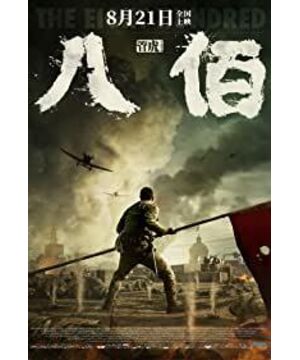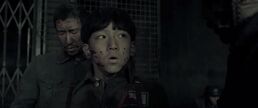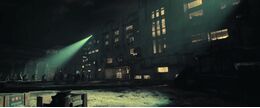Let's talk about the topic that everyone cares most about, so much that the film has been postponed for one year - "Praise the Flying General"?
From the beginning to the end of the film, Sun's name only appears in the background narration at the very beginning. As for others? The reason why the flying general is called the flying general, of course, has long since fled to Nanjing. Even if 13 minutes were cut tragically, I believe it would be difficult to use these 13 minutes to portray the escaped general as a "celebrated hero".
Yes, we cannot deny that this army belongs to the National Party, but should it be given a one-sided denial just because they belong to a party that once belonged to a different party? What's more, the overall tone of the film is that Sun took his 88th Division's troops to Nanjing, leaving such a mere 420 people of the 524th Regiment alone in the Sixing warehouse. This is clearly the biggest criticism of Sun! How heroic the "Eight Hundred Heroes" fought on the battlefield, how profoundly Sun Yuanliang's ugliness was portrayed.
Should they be denied just because they risked their lives to raise the blue sky and white sun flag in the warehouse of the Four Elements? But you look at their faces, they are just like us, and the blood of Chinese people is flowing in their veins! At the critical moment of our nation's survival, our great party also chose to put aside the party battles and unite with the National Party to face the attack of the Japanese aggressors. (I really hate that Xiao Xiurong's lecture notes are not at hand.) They are Chinese first, and secondly the 524th Regiment of the 88th Division of the Nationalist Party. Do they really deserve to be denied all of their lives just to protect their homeland?
In the film, through the mouth of a director of the Nationalist Party, played by Huang Xiaoming, the Nationalist Party defines this war as a laughing stock, what about us? "History will remember what's here, so let's leave it to future generations to comment." But if we don't dare to face history, but blindly deny it, how chilling it would be. There is a sentence in the film that is particularly appropriate, "Behind the war is politics", maybe we always live in the era of war.
The film spends a lot of ink on "individuals". Whether it is the sheep crutch (played by Wang Qianyuan) who gave his life unconditionally to the war, or the old abacus (played by Zhang Yi) who only knew how to escape from the beginning to the end, the character of each little character can be portrayed and presented in an extremely delicate and objective manner. What the camera is talking about is human nature, there is no such thing as "correct" at all.
In this sense, Sun, as the creator of this battle in a sense, is always absent in the film, which also symbolizes the image of the "flying general" escapee. It is worth noting that the image of the "old abacus" escapee in the film is actually a critical insinuation of the absent role of Sun.
Here's the real movie review section
1. "Play"
"Eight Hundred" is a heroic but poetic war film. The intention of the white horse has a surreal poetic meaning in this film. Every appearance of the white horse seems to say: "Art is beautiful". The film uses a lot of elements of traditional opera art and considers factors other than the plot, which also makes the film more ethnic and fits the theme of the "national spirit" of the film.
Actress, actress, singer.
The film chose to visualize the vastly different lives on both sides of the Suzhou River through the presentation of these characters. They are still "business girls do not know the hatred of subjugation" performing. Separated by a river, two worlds. This side of the Suzhou River is devastated and scorched, while the other side of the river is singing and dancing. Through the juxtaposition of the two lives, a strong contrasting tension is created. The indifference of "watching the fire from the other side" is the starting point of the film.
But these images are not formatted, their identities are all related to the word "play". They themselves play the role of being seen, and their seeing and being seen have undergone two quiet changes.
The first was a shift in their audience.
In the beginning, the objects they performed were the people in the concession. That is, the people they serve are people who seem to have nothing to do with war and who don't care about it. Including themselves, they only care about themselves and don't ask about the blood and tears on the other side of the Suzhou River.
But when the "Eight Hundred Heroes" completed their first heroic guard, the people on this side of the concession were greatly excited. The troupe began to perform for the "Eight Hundred Heroes", and the singer began to sing for them. The change this time symbolizes a change in the attitude of the Chinese people towards the resistance war. Just as the big plaque of the troupe reads "Heroes last forever", they are not actors who do not know the hatred of subjugation of the country. It is also worth mentioning that the lines of the troupe's singing have always maintained a synchronous effect with the current situation, which is regarded as a duet-style narrative expression.
As Xie Jinyuan (played by Du Chun) said, the importance of this battle is not whether it really sticks to it in the end, it is the people who need a victory too much. Since the September 18th Incident in 1931, the Chinese have always been on the passive side. It seems that losing has become a normal thing - the common people's numbness to the war is precisely because of this. Of course they hope that the country's army can win, but hope seems to be powerless. However, the successful resistance of the "Yao Bai" this time has rekindled the enthusiasm of the Chinese people for the war of resistance. This act of singing to them is an expression of a shift in perspective, and it is also an awakening of the patriotic enthusiasm of the Chinese people.
The second transition is the transition between being watched and watching a play.
When the troupe stood by the river and looked at the soldiers on the other side; when the singer stared at the Dragon Boat Festival (played by Ou Hao) on the other side from the window; when the actress pushed her camera to the Sixing warehouse on the other side of the river, they themselves became There are audiences, and the "actors" are "Yao Bai" on the other side of the river. The meaning of the play itself was quietly misappropriated.
Because of the special historical node, this battle has received too much attention. And the order issued by their superiors to let them stick to it for four days is also to make a good posture in the world, so that they can get a better chance of winning in the international conference. Whether it is the Kuomintang officers and soldiers, the people on the other side of the river, and Western observers in the airship, they are all watching their every move. And they are watched all over the world like actors.
2. "Little People"
The film's performance of the three-point introduction to the character's character is particularly wonderful. This is also a very clever cut in the film's choice of war characterization. Real and vivid little people, brought together, formed a historical group portrait of the entire war.
In particular, the little characters in the concession, although they have not been deeply portrayed, their repeated appearances in various periods of the film not only play a role in connecting the whole film, but also express the meaning of their always "present", and they are also always present. Concerned about this battle, there is no absence. And over time, they also outlined a beautiful arc of characters.
The university professor in the attic just picked up the binoculars and looked at the other side, and finally couldn't help but picked up the long gun and opened fire on the Japanese snipers; the female boss who only cared about the casino business, finally gave the morphine she kept privately to the needy The "Eight Hundred Heroes" who were rescued. In fact, it is worth noting that, as mentioned above, they were not born indifferent at the beginning, but the war had given them too many blows, as if they had no lines, but directly gave a portrait to the female boss's house. The camera revealed the identity of the martyr's widow of the female boss. Even Mr. Fang's character as a traitor rushed back into the hail of bullets in order to retrieve the suicide note dropped by the soldier when he finally crossed the bridge.
The Dragon Boat Festival has grown from a young boy who dare not kill people to a real soldier who dares to rush to the front line. "Why do we have to fight? We are farming." This sentence of the Dragon Boat Festival actually tells the background of that era.
But if there is a positive image in the war, there must be a negative image, and the most valuable thing in this film is the description of this negative image.
Lao Tie (played by Jiang Wu) clearly has the image of a strong man, but he is too cowardly. But he was so humane that after seeing his companion injured, he stepped over the sandbag and tried to drag him back even if he was in danger of being shot. He's not bad, he's just too scared to die. He said that if he died, he would bring a letter to his son, saying that he was not afraid of death. He also wants to be a person who is not afraid of death, but it is really too difficult for him.
The old abacus (played by Zhang Yi) is really the biggest highlight of the film. The nature of greed for life and fear of death has been brought into full play. This is an unavoidable weakness of human nature, and only by facing this survival instinct can we see the ultimate truth.
The film, which was supposed to be released this time last year, was supposed to appear in the opening film of the Shanghai International Film Festival. How suitable is this film about Shanghai for the Shanghai Film Festival. It's a pity that because of all kinds of remarks, all kinds of remarks that shouted Guanhu and praised the Kuomintang before seeing the movie, the movie was shelved for a year, and 13 minutes were tragically deleted. Even without the 13-minute movie, it is not bad, but we Of course, I look forward to a more complete art. Let's give art back to art and stop hurting her.
View more about The Eight Hundred reviews











